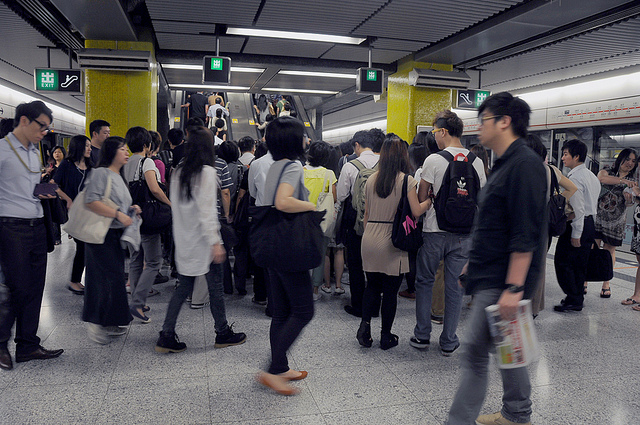"China has done little to retain foreign residents"
January 27th, 2014 China welcomes foreigners, writes Chris Fox, a Correspondent from Canada now living in Beijing, but he argues that it is difficult for foreigners to feel truly at home in the rising super-power country.
China welcomes foreigners, writes Chris Fox, a Correspondent from Canada now living in Beijing, but he argues that it is difficult for foreigners to feel truly at home in the rising super-power country.
The lived experience of foreigners in China has become something of a hot topic in recent months. The Economist and others have reprinted several essays written by long-term China residents around such themes as “Why I’m Leaving China.”
Increasingly, people have begun to consider the viability of China not only as a business opportunity but also as a place to reside long-term. So far, conclusions are mixed.
Having lived and traveled in China for a number of years, visits back home inevitably include more than a few “so what’s it like?” conversations. There is of course the good and the bad. But aside from the more intuitive advantages and drawbacks there is, I think, an aspect of residing in China long-term which goes under-discussed: something we might call “Othering” – being constantly reminded in ways subtle and not that you are not of this place and that you never, ever, will be.
Important to note, what I don’t mean is outright racism or discrimination – on the contrary, in my experience Chinese are nothing if not welcoming of foreigners, particularly those who can speak Chinese. Yet as a Chinese-speaking foreigner, I’ve increasingly become aware that rather than feeling more a part of my adoptive society as the years go on, I feel decidedly less. Why?
Beyond any supposed differences in values or culture is a reason more mundane. Quite simply, I am constantly, in almost every situation, reminded I am not authentically of this place, and am different from those around me. Be it buying groceries, taking a cab or paying bills, there are days when literally every Chinese I interact with inquires where I’m from, why I’ve come, and significantly, how much longer I plan to stay. A small thing I admit, but as a resident of a place it becomes difficult to ever imagine yourself as a part of it when you are routinely reminded that you are not.
Inquisitiveness aside, this Othering takes on less thoughtful forms. Every time a group of Chinese yells “hello!” at a foreigner and walks off laughing, every time a foreign-resident is asked for their photo on their way back from work, or handed a fork after ordering in Chinese, a divide is widened which makes the thought of staying permanently that much more untenable.
To be sure, the life of foreigners living in China is often materially quite comfortable. What I am suggesting however is that an accepted manner of treating the Other goes without being reflected upon by a majority of Chinese, yet should be. While China has done much to attract foreign investment and obtain foreign technology, it has done much less to retain foreign residents.
Looking at the bigger picture, the great powers of the past were for the most part cosmopolitan places. It is difficult to imagine an innovative America, for example, in the absence of immigrants, or a “marketplace of ideas” without diversity. Likewise, it is hard to fathom a new super-power which doesn’t attract and retain talent from abroad.
photo credit: faungg’s photo via photopin cc
…………………………………………………………………………………………………………………
About me: I’m from a touristy little town in Canada. Now I live in Beijing. For most of what I could loosely call my adult life I’ve been fairly obsessed with Asia in general and China in particular. So, naturally enough, I’m interested in issues of development, authoritarianism and civil society. I also enjoy travel and 30+ hour train rides.
In the future I hope to work in the Foreign Service or some international body that does good things in interesting places.
…………………………………………………………………………………………………………………
Opinions expressed in this article are those of the author and do not necessarily represent the views of the Commonwealth Youth Programme. Articles are published in a spirit of dialogue, respect and understanding. If you disagree, why not submit a response?
To learn more about becoming a Commonwealth Correspondent please visit: http://www.yourcommonwealth.org/submit-articles/commonwealthcorrespondents/
…………………………………………………………………………………………………………………
…………………………………………………………………………………………………………………
About me: I’m from a touristy little town in Canada. Now I live in Beijing. For most of what I could loosely call my adult life I’ve been fairly obsessed with Asia in general and China in particular. So, naturally enough, I’m interested in issues of development, authoritarianism and civil society. I also enjoy travel and 30+ hour train rides.
In the future I hope to work in the Foreign Service or some international body that does good things in interesting places.
…………………………………………………………………………………………………………………
Opinions expressed in this article are those of the author and do not necessarily represent the views of the Commonwealth Youth Programme. Articles are published in a spirit of dialogue, respect and understanding. If you disagree, why not submit a response?
To learn more about becoming a Commonwealth Correspondent please visit: http://www.yourcommonwealth.org/submit-articles/commonwealthcorrespondents/
…………………………………………………………………………………………………………………




